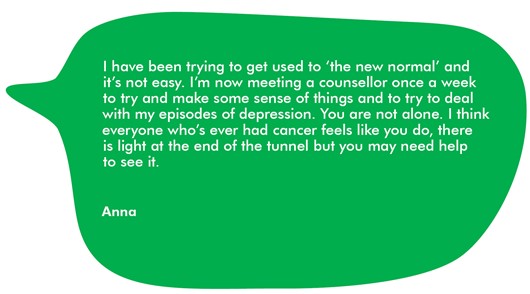*Edited 03/07/17
In this blog, editorial assistant Amy-Louise talks more about cancer and depression, and why talking may help.
After receiving a diagnosis of cancer, you may experience a range of feelings and emotions. You might feel angry and resentful, or fearful and anxious. You might experience all of these feelings at once. These reactions are common and there is no right or wrong way to feel. You may also feel low at times. For some people, their low mood may get worse and this could lead to a diagnosis of depression.
Depression is a common condition that can affect anyone, at any time of their life. However, getting a cancer diagnosis, or being treated for cancer can cause depression.
Some of the symptoms of depression include:
We want to highlight the importance of talking about depression. Many people with depression keep their feelings to themselves, which means they don’t get the help they need.
From my own experience, being open about depression can not only be of benefit to you, but those who care about you. Staying silent means that your thoughts can build up and be difficult to deal with on your own. It can be a relief to talk to someone, as it can help you to make sense of how you feel.
You may worry about upsetting others, or that they might not know how to react. You may also worry that people will treat you differently. But talking about how you feel can help you cope with uncertainties or difficulties and help you have some control over your situation.
It might be other people that notice your symptoms and suggest that you may need help. Trying to put how you are feeling into words can be difficult. But opening up about your feelings can help others to support you. You may find it easier to write your feelings down first, as a starting point for conversation.
Here are some suggestions of people you can talk to about how you feel:
You may find it helpful to talk to someone going through a similar situation to you. Our online community lets you talk to people in our chat rooms, blog about your experiences, and make friends. Support groups also offer the opportunity to talk to others who are facing cancer and depression.

We have more information on our website about cancer and your emotions and what help is available. We also have a booklet called How are you feeling? The emotional effects of cancer. You can order a free copy by visiting be.macmillan.org.uk or by calling 0808 808 00 00.
If you know that you need to speak to someone but you don’t know where to start, the Macmillan Support Line is a free, confidential helpline which is open Monday to Friday, 9am to 8pm. Call 0808 808 00 00. If you are feeling extremely low and are struggling to cope, you can also contact the Samaritans 24 hours a day, 365 days a year, on 116 123. Help is always available and you are never alone.
To see what else Macmillan's cancer information team has been blogging about, please visit our blog home page! You can subscribe to receive our blogs by email or RSS too.
We're with you every step of the way
The Macmillan team is here to help. Our cancer support specialists can answer your questions, offer support, or simply listen if you need a chat. Call us free on 0808 808 00 00.
Comments? Feel free to add them below (you need to be logged in).
Keep in touch Follow Macmillan’s cancer information team on Twitter @mac_cancerinfo
Whatever cancer throws your way, we’re right there with you.
We’re here to provide physical, financial and emotional support.
© Macmillan Cancer Support 2026 © Macmillan Cancer Support, registered charity in England and Wales (261017), Scotland (SC039907) and the Isle of Man (604). Also operating in Northern Ireland. A company limited by guarantee, registered in England and Wales company number 2400969. Isle of Man company number 4694F. Registered office: 3rd Floor, Bronze Building, The Forge, 105 Sumner Street, London, SE1 9HZ. VAT no: 668265007